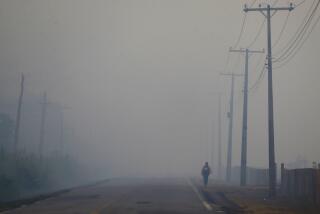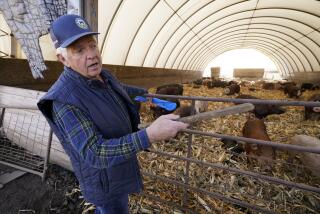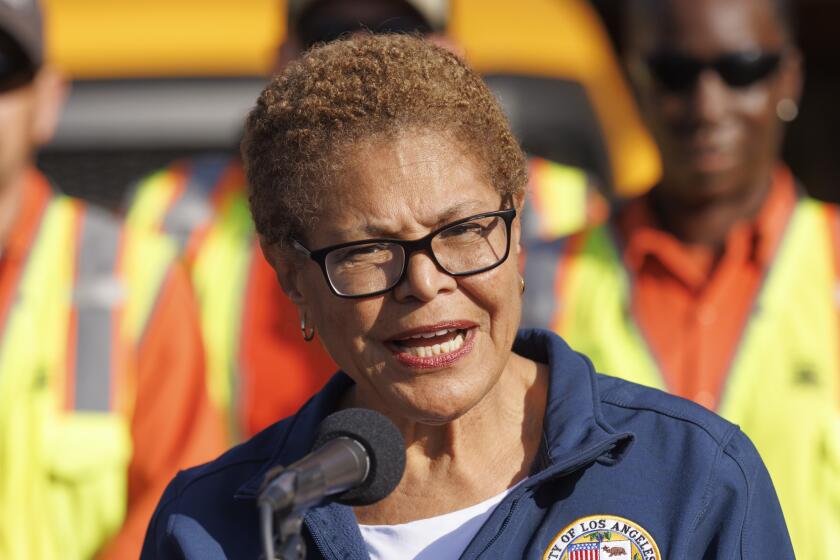Cows are killing the Amazon. Pledges from Walmart and Nike didn’t help save it
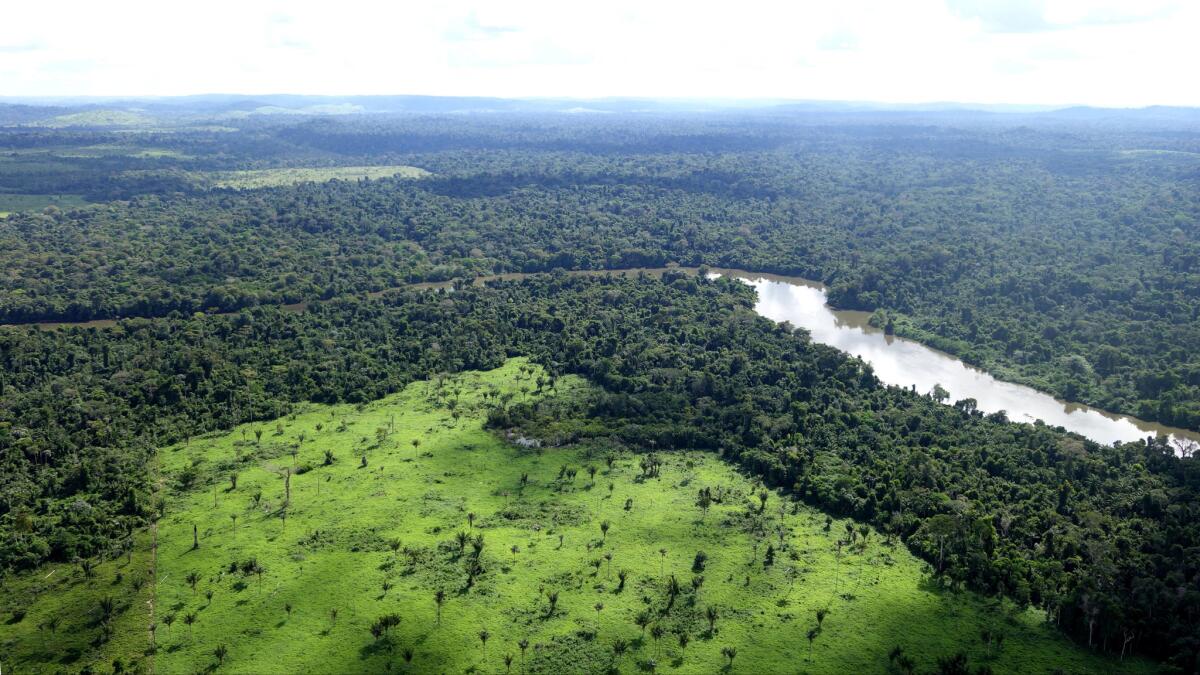
- Share via
REDENCAO, Brazil — It was a moment of hope in the fight to save the world’s largest rainforest.
In 2009, Walmart, Nike and other global companies vowed to stop buying beef and leather from Brazilian companies operating in the Amazon.
They were responding to pressure from the environmental group Greenpeace, which had determined that cattle ranching there had become the largest driver of deforestation in the world, with an average of one acre of the Amazon cleared every eight seconds for grazing.
The threat of a boycott didn’t last long, thanks to a pledge by Brazil’s largest beef processors — responsible for 70% of beef production in the Amazon — to rigorously monitor their supply chains and avoid doing business with ranches linked to post-2009 destruction of forest.
In the northern state of Para, where most of the deforestation has occurred, the meatpacking companies went even further and entered into a legally binding agreement with the state government mandating fines and abattoir closures if their cattle were not cleanly sourced.
But a decade later, the Amazon is in even graver danger, with 17% of its forests already gone and some scientists warning that losing as little as 3% more could begin turning it to savanna because the ecosystem will produce too little rainfall to sustain itself.
This year has been especially bad as more than 70,000 fires — most set by farmers and ranchers to clear land — have dramatically accelerated the pace of deforestation.
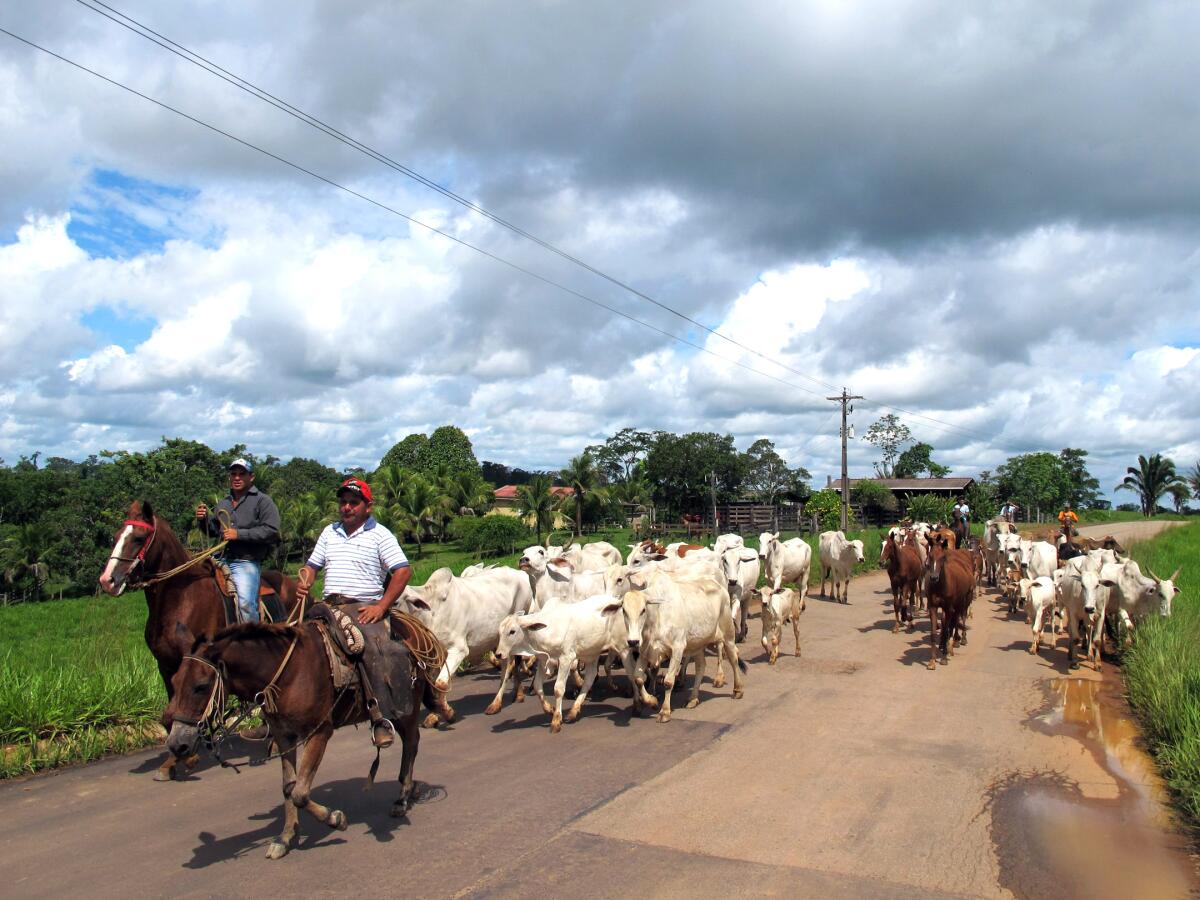
Cattle ranching remains the biggest driver, responsible for 80% of the deforestation, according to the Yale School of Forestry and Environmental Studies.
The failure of the monitoring agreements illustrates the limits of environmental activism and the necessity of political will if the Amazon is to be saved. Experts said the experience shows that pledges and laws amount to little if authorities are not dedicated to enforcing them and closing loopholes.
Brazil produces more beef than any other country except the United States and exports more than anywhere else, sending 20% of its production to Hong Kong, China, the European Union and several smaller buyers.
The Brazilian company JBS, the world’s largest meatpacker with more than $50 billion in annual revenue, counts Walmart and Costco as major clients.
Its cattle suppliers include tens of thousands of ranches in the Amazon, making the company by far the most important player in the 2009 promise by meat processors to cut ties to ranches involved in deforestation.
The company became Exhibit A in what appeared to be a dramatic success. It cut off business with thousands of ranches after its monitoring systems flagged them.
By 2013 just 4% of Amazon-based suppliers to JBS and other meatpackers in the Para agreement could be linked to deforestation — down from 36% before the measures took effect, according to a study by researchers at the University of Wisconsin and the Brazilian nonprofit Imazon.
More broadly, cattle became easier to trace, because the tens of thousands of ranches that supplied the slaughterhouses covered by the Para agreement registered their properties with the state government. The vast majority had never had a legal deed to their land.
Now they could be tracked in real time using satellite imagery and publicly available databases of geographic data.
Brazil has touted the statistic that the rate of deforestation fell 70% between 2005 and 2012.
But most of that drop occurred before the ranch-monitoring deals took effect and could be attributed to declining commodity prices, which reduced incentive to clear forest for grazing and soybean cultivation. The leftist government in power at the time also made environmental conservation a priority, designating 150 million acres of rainforest as protected land and stepping up efforts to arrest and fine violators.
The monitoring agreements suffered from two major problems.
First, the Para state deal covers only the slaughterhouses owned by the meatpacking companies that signed on to it.
That means that of the 157 slaughterhouses in the Amazon, roughly half — responsible for the killing of 18,000 cattle a day, or 30% of beef production in the region — have no checks on their cattle supplies, according to Imazon.
“Those who signed deforested less, but unregistered farms had a much higher deforestation rate than expected,” said Paulo Barreto, the lead researcher at the nonprofit. “So it eventually neutralized, and the net effect of the deal ended up being null.”
The second problem is that there is no guarantee that beef from the approved ranches is actually rainforest-friendly.
JBS and other big meatpackers are required to monitor only their direct suppliers — and not the ranches and fattening farms that frequently supply those suppliers. Experts said it has become common practice for dirty ranches to “launder” their cattle through ranches that have been deemed clean.
A recent third-party audit found that in 2016 JBS slaughtered 85,000 cattle that came from areas the government determined were illegally deforested.
The following March, the Brazilian federal government fined JBS nearly $8 million and shut down two slaughterhouses after an investigation found the company was buying cattle from ranches illegally carved out of the forest. As a result, Greenpeace said it could no longer recommend that companies such as Walmart, Costco and Nike do business with JBS.
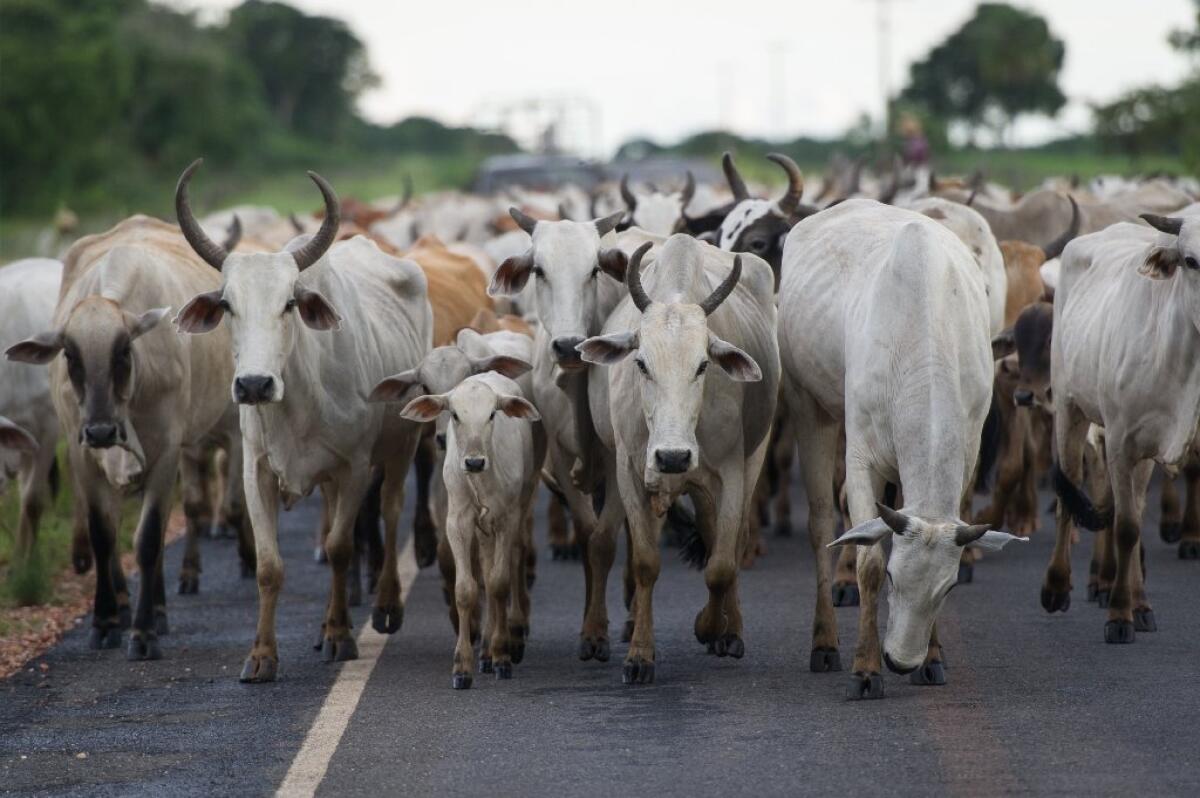
“We consider the Brazilian cattle sector as a whole to be high risk for companies who want to be clear of deforestation because of the problem of indirect suppliers,” said Daniel Brindis, the forest campaign director for Greenpeace USA. “It’s still a black box where many of the cattle are coming from.”
The global companies have continued to do business with beef and leather producers in Brazil. Rather than threaten another boycott, some have taken the less confrontational approach of trying to work with the beef industry and various nonprofits in hopes of reducing deforestation.
Walmart, for example, has set up a “Brazil Beef Monitoring System” and asked its suppliers there to “source and use only beef that has been produced with zero net deforestation” no later than the end of 2020.
That may be too optimistic. A joint investigation published this year by the Guardian, Reporter Brasil and the Bureau of Investigative Journalism found that a farm operating near Sao Felix do Xingu in the state of Para was raising cattle on illegally cleared forest and then laundering them through legal fattening farms, which sold to JBS.
In a statement, JBS defended its operations and maintained that it does not buy cattle from farms linked to deforestation.
“The JBS Amazon monitoring system covers more than 280,000 square miles, an area larger than the state of Texas, and assesses more than 50,000 potential cattle suppliers every day,” the company said in a statement. “When a noncompliance with our policies is identified, we take decisive action.”
JBS has acknowledged, however, that it has no way to monitor indirect suppliers.
The United States and Canada track cattle using a system that requires ranchers to affix an ear tag with a microchip to every cow shortly after birth, at a cost of a few dollars per animal.
Brazil has never had the political will to institute such a system, and the chances of it happening anytime soon appear low.
The new president, Jair Bolsonaro, was elected in large part for his nationalist views, including the common belief that Brazil should be free to develop the Amazon as it sees fit.
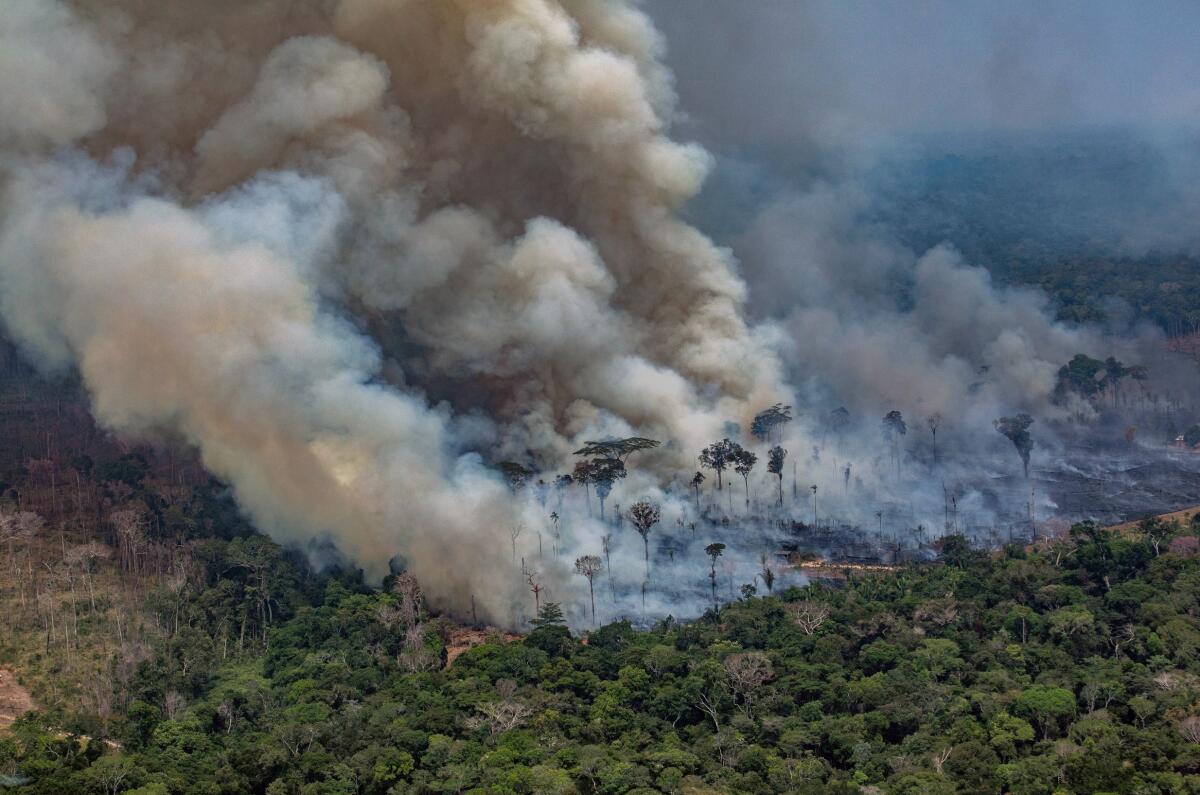
This summer, as fires raged, Bolsonaro refused to accept $20 million in international aid to help put them out. He declared such assistance a form of colonialism.
Moreover, worldwide demand for beef continues to grow as China and other developing countries get richer.
The United States, the world’s largest consumer of meat, has banned fresh beef imports from Brazil since 2017, when a Brazilian investigation that found food inspectors had taken bribes to falsify sanitation records.
But that ban could soon be lifted.
In March, Bolsonaro visited Washington and left with a tentative promise from President Trump to start accepting Brazilian beef pending a U.S. government audit of the Latin nation’s food safety inspection system.
U.S. Department of Agriculture inspectors visited 12 Brazilian slaughterhouses in June but have yet to release their findings.
Still, Jordan Timo, a cattle rancher in Para, said he remains optimistic that it’s not too late to save the Amazon.
His own story shows that change is possible. In the mid-1990s, he recruited 200 men and gave them chainsaws to clear the jungle that became his ranch.
But after the 2009 agreements, Timo started a company called Nice Planet, which contracts with beef producers to verify their suppliers are clean, to the extent that’s possible.
“The laws are there,” he said. “What we lack are police resources to crack down on this.”
Ultimately, he said, the fate of the forest will be determined by market forces.
“If there’s not a commitment from consumers, and not just in Brazil, but around the world, to seek out beef that’s sourced ethically, then farmers here will continue to seek out the easier path, and right now that’s deforestation.”
Hyde is a special correspondent. This article was supported by the Pulitzer Center on Crisis Reporting.

